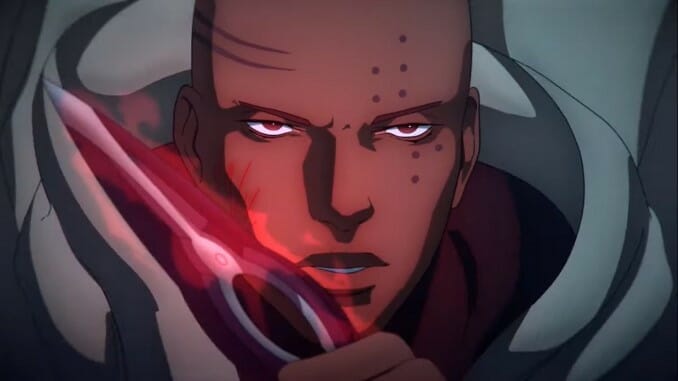Castlevania Concludes with Grand Emotion, but Forgets Its Own Best Character
Photos via Netflix
![]()
If there’s one thing in particular that separates an animated series like Netflix’s own Blood of Zeus from the likes of Castlevania—they both share the same animation studio—it’s that the latter, the streamer’s first true exploration of original anime, has always stood out for how effectively it harnesses a grand, melodramatic pathos for its characters. Where something like Blood of Zeus offers simple, pulpy pleasures and a fun (if rather conventional) twist on familiar mythology, Castlevania always strove for something a bit more profound. Is it silly to suggest that the animated adaptation of a vampire-slaying NES game could occasionally possess moments of beautiful clarity and catharsis that would make your heart ache, or bring a tear to your eye? Perhaps, but that doesn’t make the high points of Castlevania, such as the death of Dracula at the end of Season 2, any less operatic or perfectly realized. At its peak, the series has delivered in a way that most animation never even attempts.
The best of Castlevania was again well represented in the just-concluded fourth and final season on Netflix, closing out the adventures of Trevor Belmont, Sypha Belnades, Alucard, and others with another explosive climax and emotional epilogue. Things got a bit on the schmaltzy side, perhaps, as the series walked back Trevor’s apparent death in the final battle in order to fully commit to a Mega Happy Ending—not to mention the surprise second chance at life for Dracula and Lisa Tepes, which was a major bit of wish fulfillment—but fans of the series should likely be happy that it managed to pull its loose threads together in satisfying fashion in only 10 episodes, given that it originally seemed like Castlevania might run quite a bit longer. Sadly, the sexual misconduct allegations brought against show creator/comics legend Warren Ellis meant that Castlevania’s conclusion ended up being condensed a bit into Season 4, but things turned out surprisingly well regardless.
That is, except for one potential oddity of Castlevania’s ultimate conclusion, which was the sidelining of the human being who has arguably been the show’s best overall character through the years. Whereas every other major character received a true farewell in the collection of epilogues that made up series finale “It’s Been a Strange Ride,” there was only one character who was strangely absent: Isaac. The soft-spoken and philosophical forgemaster actually doesn’t appear a single time in the final four episodes of Castlevania—a curious choice that feels like a missed opportunity to conclude his story in the most satisfying way.
Granted, Isaac’s final appearance in the season/series, in the closing moments of Episode 6, “You Don’t Deserve My Blood,” serves in retrospect as a perfectly functional send-off to the character; it’s just a bit odd that it comes when it does, halfway through the season. The stoic forgemaster has just finished leading an assault on Carmilla’s castle, with his hoards of night creatures slowly wearing down the vampire queen until Isaac is able to personally engage her in a spectacularly animated duel that ends in her dramatic self-immolation. It’s a triumphant moment for him, although not really one that feels natural as a conclusion to his story, primarily because taking down Carmilla had never really been a stated desire of Isaac before this point. If he had been bearing some kind of longstanding grudge against her, viewing the toppling of her fledgling empire as his ultimate act of revenge for the death of Dracula, it might have sufficed. But the first half of Season 4 highlighted the growth and change of Isaac’s objectives, going from an utter disdain for humanity to a grudging acceptance that perhaps there are things in life worth holding onto. As such, his assassination of Carmilla feels less like the culmination of some great work for his character, and more a tentative first step toward whatever he intends to do next, which is kept quite vague. As Isaac puts it in his conversation with Hector after Carmilla’s death: “I have recently begun to consider the future, which has been a novelty for me, because I never really thought I had one.”
-

-

-

-

-

-

-

-

-

-

-

-

-

-

-

-

-

-

-

-

-

-

-

-

-

-

-

-

-

-

-

-

-

-

-

-

-

-

-

-








































